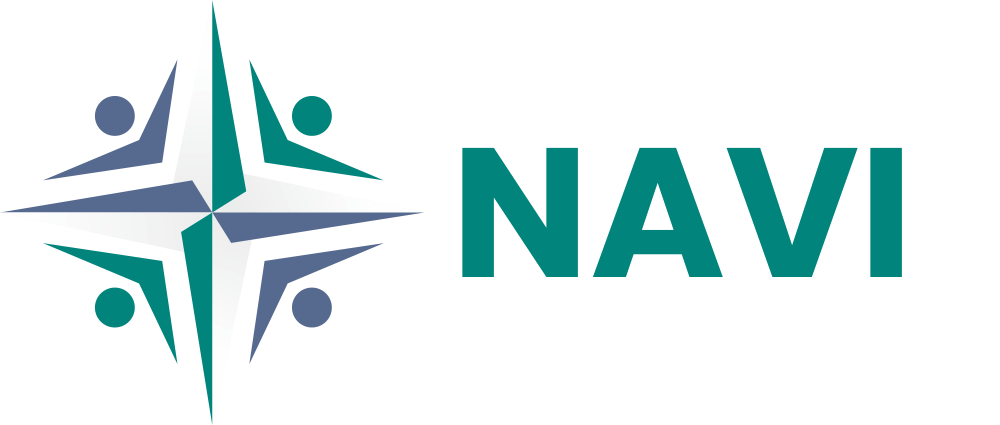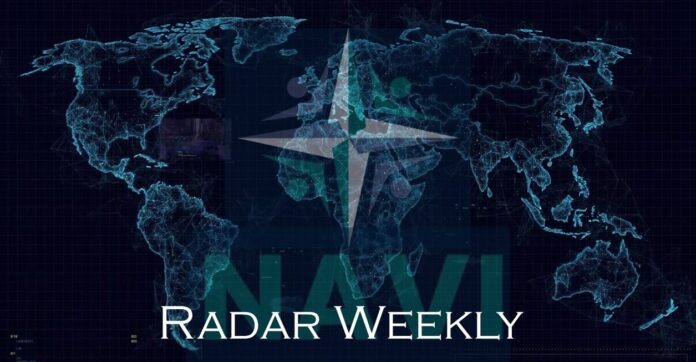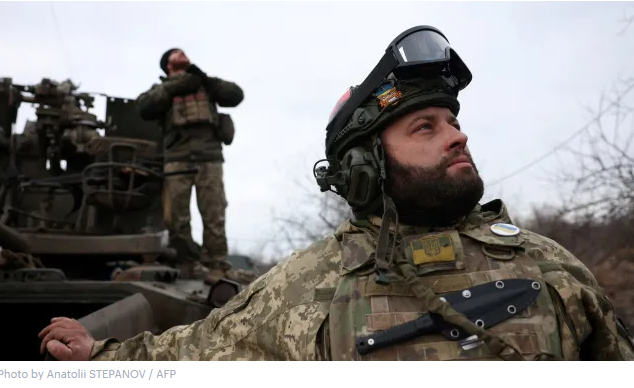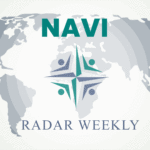Subscribe to NAVI Radar Weekly here
Focus Point: Regional Security- Middle East
Iran will ‘face consequences’ for attack, vows Israeli military chief | Euronews
Euronews with AP| 15.04.2024
Israel’s military chief said on Monday that Israel will retaliate to Iran’s weekend strike, but did not immediately elaborate when and how.
Lieutenant General Herzi Halevi said Israel is still considering its next steps. But he assured the Iranian missile and drone attack “will be met with a response” during a visit to the Nevatim air base in southern Israel. Read more…
Focus Point: Security and Defense Policy- Russia-Ukraine War
Europe’s Decade of Failure in Ukraine | CEPA
Aliide Nayor | 15.04.2024

Europe’s failure to stand alongside Ukraine in 2014 cleared the way for the full-scale invasion of 2022. There’s little sign it’s learned how to deal with further Russian aggression.
The consensus at the symposium was that the EU needs to realize its collective strength in the face of Russian aggression, and in dealing with the threat needs to take stronger practical steps. The West’s united response in shooting down Iranian drones aimed at Israel on April 13 has deepened Ukrainian indignation — it is repeatedly left alone to deal with constant barrages of Russian drones and missiles.
There is a need for a stronger and more inventive collective strategy, one which is proactive, as opposed to reactive.
As murdered Russian opposition politician Alexey Navalny’s widow has said, in order to defeat President Vladimir Putin, you have to “become an innovator . . . You have to stop being boring.” Europe should take note. Read more…
Focus Point: Emerging Technologies & Data- Standards
Fact-check: Is the EU digital identity wallet going to strip away our privacy?| Euronews
James Thomas | A Must Read|16.04.2024

The EU’s new digital identity wallet, designed to streamline personal information storage and sharing, has raised concerns and conspiracy theories. The Cube takes a look at them.
The EU’s incoming digital identity wallet has sparked claims on social media and by politicians that Brussels intends to strip away citizens’ privacy and exert control over their lives.
The wallet, which is still in the pipeline, is an app that will let users store key information like official ID and bank details in a single, secure place. It will allow citizens, residents and businesses to prove their identity to access public and private services across Europe.
The European Commission states that the wallet will provide a simple and safe way to control how much information people wish to share with services that ask for personal data, taking control of one’s data from large organisations and giving it back to the individual.
Is Europe heading toward Chinese-style social credit system?
Other social media users have asserted that the EU digital identity wallet is a step away from China’s controversial social credit system, which gives individuals, businesses and government entities a credit score based on their trustworthiness.
This trustworthiness is based on one’s social behaviour and is regulated through actions such as paying bills on time and abiding by the law.
Schmidt said it’s normal that people might feel a degree of fear when governments introduce new technological solutions, but once again assured that the EU digital identity wallet is a case of the government handing the control of data from itself over to citizens.
“So in that sense, it’s almost the opposite direction from the Chinese credit system,” she said.
Jacobs voiced a similar opinion, arguing that the idea the EU digital identity wallet is akin to a social credit system has no basis.
“China’s social credit system is of a totally different order and requires really the kind of political decision that I don’t think we’re ready in Europe to take,” he said. “And of course, wallets could be used for such technology. But ordinary passports can also be used for such technology. So I think they are fairly independent issues.” Read more…
Focus Point: Regional Security- Transatlantic Security-NATO
NATO Deputy Secretary General addresses the Brussels Forum about “NATO at 75” |NATO
NATO| 18.04.2024
In a panel discussion at the German Marshall Fund’s Brussels Forum on Thursday (18 April 2024), Deputy Secretary General Mircea Geoană underlined the importance of the NATO Alliance throughout its 75-year history. The Deputy Secretary General spoke at a two part panel, titled “NATO at 75: Past, Present, Future” and was joined by Lord Robertson, former NATO Secretary General.
Mr Geoană: I think there is a gene in our genetical code as an Alliance, a gene, a permanent adaptation to changing strategic environments, and also a gene of learning from our mistakes.
So the question is why, in 1949, there were 12 Allies as founding Allies, and why today we are 32. So what makes this Alliance so magnetic, to European nations? Why do these nations continue to knock on the open door of NATO, and I do hope and I know that one day, also Ukraine will become a member. And I hope that every free nation in Europe will choose their own path if they want to come. And if they qualify, and if we agree by consensus, then we’ll be okay. 75 years is an impressive age for us.
But because I run innovation at NATO, I would say that NATO has other than our values and always the mission that we share, I think we have in our genes. I think there is a gene in our genetical code as an Alliance, a gene, a permanent adaptation to changing strategic environments, and also a gene of learning from our mistakes. Read more…
Focus Point: Security and Defense Policy- Emerging Threats and Global Risks
China is a threat to Europe’s gunpowder supply, defense boss warns |Politico
Laura Kayalı| 18.04.2024
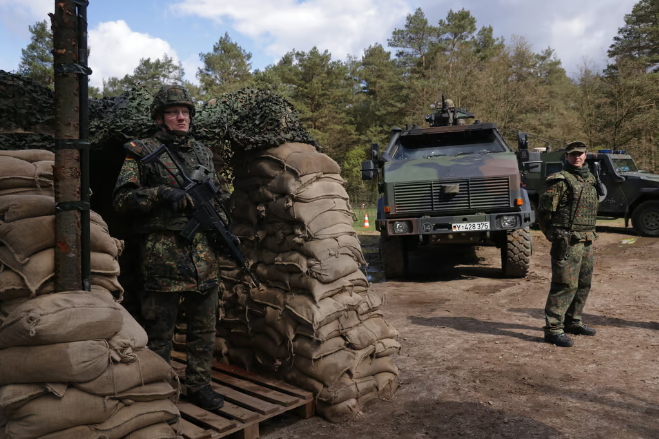
Europe is too reliant on China to make powder for ammunition and risks a supply crisis that could threaten the continent’s security, one of the EU’s most important defense contractors warned.
In an interview with POLITICO, Saab CEO Micael Johansson called on governments to cut environmental rules to make it easier for companies to diversify their supply chains for critical military components.
Beijing plays a key role in supplying EU countries with the raw materials they need for their defense industries, even though China is also providing vital support to Vladimir Putin’s war machine in Ukraine. Read more…
Focus Point: Regional Security- Middle East
European leaders call for calm after reported Israeli retaliation against Iran |Euronews
Clara Preve and Angela Skujins | 19.04.2024
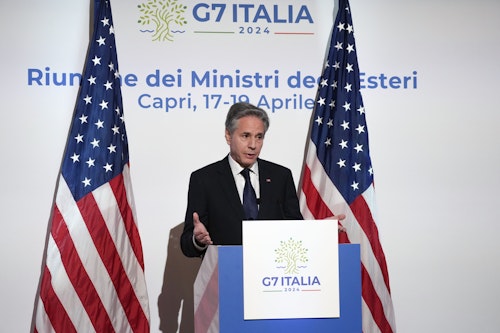
The G7 foreign ministers warned against new sanctions on Iran and called all parties to prevent further escalation in the Middle East.
Sources say Israel has retaliated against Iran, following Tehran’s recent attack on Israel.
Rising tensions between the two regional foes have pushed the Middle East ever closer to war, causing concern in Western capitals.
Iran has been on high alert for days after Israel vowed to respond to Tehran firing 300 drones and missiles against its territory on Saturday night. Read more…
Focus Point: Regional Security- Transatlantic Security-European Security
The 7th European Defence & Security Summit: Towards a Stronger European Defence Industry | NAVI Research Institute
Umit Kurt | 19.04.2024
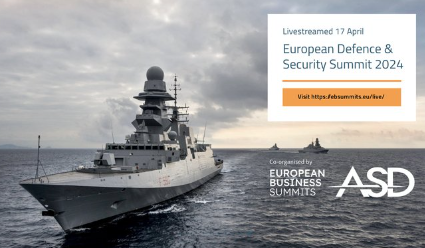
The 7th European Defence & Security Summit took place in Brussels on 17 April 2024. The 2024 edition focused on the defense industrial dimension of European security. It brought together European leaders and practitioners from national governments, EU institutions, NATO, industry, and armed forces to discuss how Europe can meet today’s and tomorrow’s security challenges.
Despite the valuable insights and assessments provided by distinguished participants, significant questions remain unanswered:
- NATO changed its capacity-based defense planning strategy after decades to a threat-based approach, which is probably more expensive and time-consuming. A firm highlight from the morning sessions of the summit was the message that winter is coming. Regarding the preparedness for the winter strategy, finance, and politics will be discussed more than enough. Still, there was little discussion about the time we needed for implementation. Besides all strategies, funds, lessons learned, etc., does the EU have enough time to build industrial capacity for building military capacity to tackle our risks and threats with or without our transatlantic Allies?
- While it is possible to fight together with at least 75 years of transatlantic experience against common and very close risks and threats, what is the rationale behind responding to an unpopular “America first” strategy, even in America with a strategy that can mean “The EU first”? In other words, while cooperation and collaboration with the US are possible, is choosing competition a rational and sustainable choice for the EU? Read more…
Read related :
EU Policy. Exclusive: European industrial strategy needed to compete with US, Letta to tell leaders
National Armaments Directors discuss plans to boost defence industrial capacity across NATO
Focus Point: Security and Defense Policy- Emerging Threats and Global Risks
Sizing up the China-Russia ‘New Axis’ | Asia Times
Noah Smith |A Must Read |20.04.2024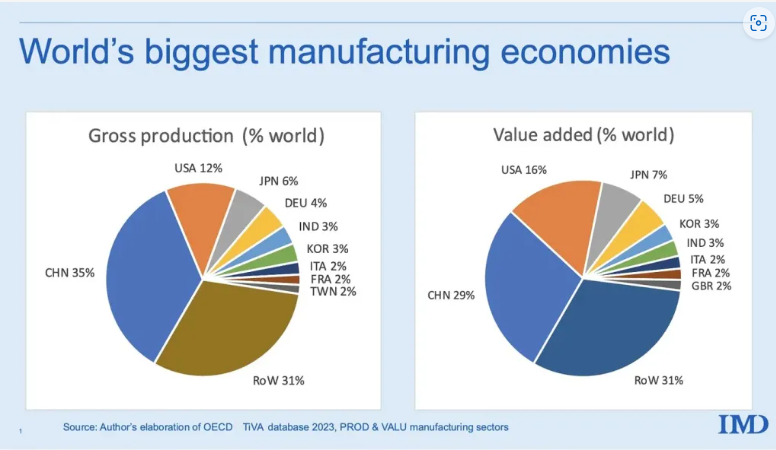
Would a China-Russia axis defeat US and its allies in a major conventional war? Here’s what the math says.
How big is this chance of defeat? Obviously, factors like training and competence come into play, and these are in favor of the US. Technological sophistication is also important and here as well the developed democracies probably still have at least a small edge over China.
But in World War 2, both skill/experience and technological sophistication slightly favored the Axis over the Allies at the start of the war. Nazi Germany started with the best ground equipment, while Japan had the best fighter planes and torpedoes, and arguably the best aircraft carriers as well.
In a long conventional war, production really matters.
But over time, massive US and Soviet production of ships, planes, tanks, and materiel ground down the Axis. And as the war progressed, the Allies learned how to fight and improved their technology rapidly, until by the end it was better than what the Axis had.
In a long conventional war, production really matters. And China has, since the turn of the century become by far the world’s biggest producer. Even before the current massive splurge of production, China was the world’s largest manufacturer by far, making as much physical stuff as the US and all of Europe combined.
The country’s (China) current effort to increase that share even further threatens to make China the “make-everything country” in reality, turning the rest of the world into a de-industrialized hinterland. Read more…
Focus Point: Security and Defense Policy – The Future of Warfare
Do Tanks Have a Place in 21st-Century Warfare? | The Newyork Times
Lara Jakes | 20.04.2024 | Subscription needed
As explosive drones gain battlefield prominence, even the mighty U.S. Abrams tank is increasingly vulnerable. ”
The drone combat in Ukraine that is transforming modern warfare has begun taking a deadly toll on one of the most powerful symbols of American military might — the tank — and threatening to rewrite how it will be used in future conflicts. Read more…
Focus Point: Security and Defense Policy- Russia-Ukraine War
Change the approach from just helping Ukraine fight to letting them win the war | The Hill
Kira Rudik | 21.04.2024
The most essential thing in war is to conquer fear. It’s not about neglecting safety but having the courage to make critical decisions, act decisively and be unafraid of mythical escalations.
We in Ukraine have overcome this fear. It cost us a lot, and often we paid the highest price. At the same time, we cannot understand why the democratic world and our partners cannot see that there is no need to fear the aggressor and there is no way back to “business as usual”.
“We needed peace earlier. Now we need a victory.”
It should be very clear that returning to how we operated with Russia before is impossible today. The democratic world, its values and its way of life were jeopardized. We all need decisive actions, perhaps even more radical than those taken at the beginning of the full-scale invasion.
Ukraine’s General Valerii Zaluzhnyi wrote on the Ukrainian Flag: “We needed peace earlier. Now we need a victory.” This is necessary not only for Ukraine but also for the entire free world. But this world should finally change its strategy from helping Ukraine fight to letting Ukraine win. Read more…
Thank you very much for reading.
The NAVI Research Institute is the research division of NATO Veterans Initiative - NAVI that provides a unique perspective to transatlantic leaders and societies on peace and security through the lens of NATO's founding principles of rule of law, democracy, human rights, and individual liberties. The NAVI Research Institute was officially established by the NAVI Board on July 16th, 2023.
